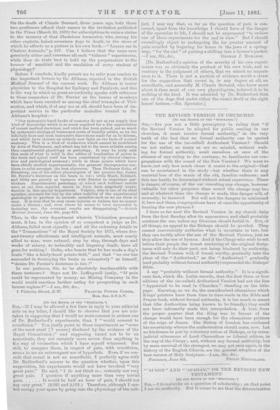THE REVISED VERSION IN CHURCHES.
rye TIM EDITOR OF rue " SPECTATOR."] Sin,—Are you not a little peremptory in ruling that " if the Revised Version be adopted for public reading in our churches, it must receive formal authority," in the very teeth of the fact that no formal authority can be quoted for the use of the (so-called) Authorised Version ? Should we not rather, as many as are so minded, without wait- ing for formal authority, avail ourselves at once of the absence of any ruling to the contrary, to familiarise our con- gregations with the sound of the New Version ? We want to, know, not only how much closer it comes to the origival—that can be ascertained in the study—but whether there is any material loss of the music of the old, familiar cadences ; and this can hardly be determined without actual experience. There is danger, of course, of the oar resenting any change, however valuable for other purposes than sound the change may be; and at whatever time the change is made, this danger will, of necessity, be incurred. But will not the dangers be minimised if, here and there, congregations have at once the opportunity of hearing the new phrases P I have so far used the Revised, Version in my church daily- from the first Sunday after its appearance, and shall probably continue the use, unless my Diocesan should forbid it. But, of all things, an appeal to the Bishops should be avoided. They cannot conveniently authorise what is uncertain iu law, but they can tacitly allow the use of the Revised Version, just as they allow the use of hymns. And if the Clergy who wish to set before their people the truest rendering of the original Scrip- tures will only do their part, not being hindered by authority,. the Revised Version will, if found worthy, gradually take the• place of the " Authorised," as the " Authorised " gradually (and probably without formal authority) superseded the Bishops' Bible.
I say "probably without formal authority." It is a signifi- cant fact, which Mr. Lof tie records, that the first three or four editions of the (so-called) Authorised. Version had not the line "Appointed. to be read. in Churches " standing on the title- page. Knowing, as we do, the unauthorised alterations which Kings' printers have from time to time made in the Bible and Prayer-book, without formal authority, it is too much to assert that (the Authorities being known to be friendly) they could not have informally made this interpolation. A hint from the proper quarter that the King was in favour of the change would have been enough for the obsequious printers of the reign of James. The Bishop of London has confessed his uncertainty whence the authorisation should come, now. Let no hindrance be put by voluntary action of Bishops, or by extra- judicial utterances of Lord Chancellors or Liberal editors, in the way of the Clergy ; and, without any formal authority, but by mere survival of the strongest, we may yet once again, in the history of the English Church, see the general adoption of the best version of Holy Scripture.—I am, Sir, &c.,




























 Previous page
Previous page